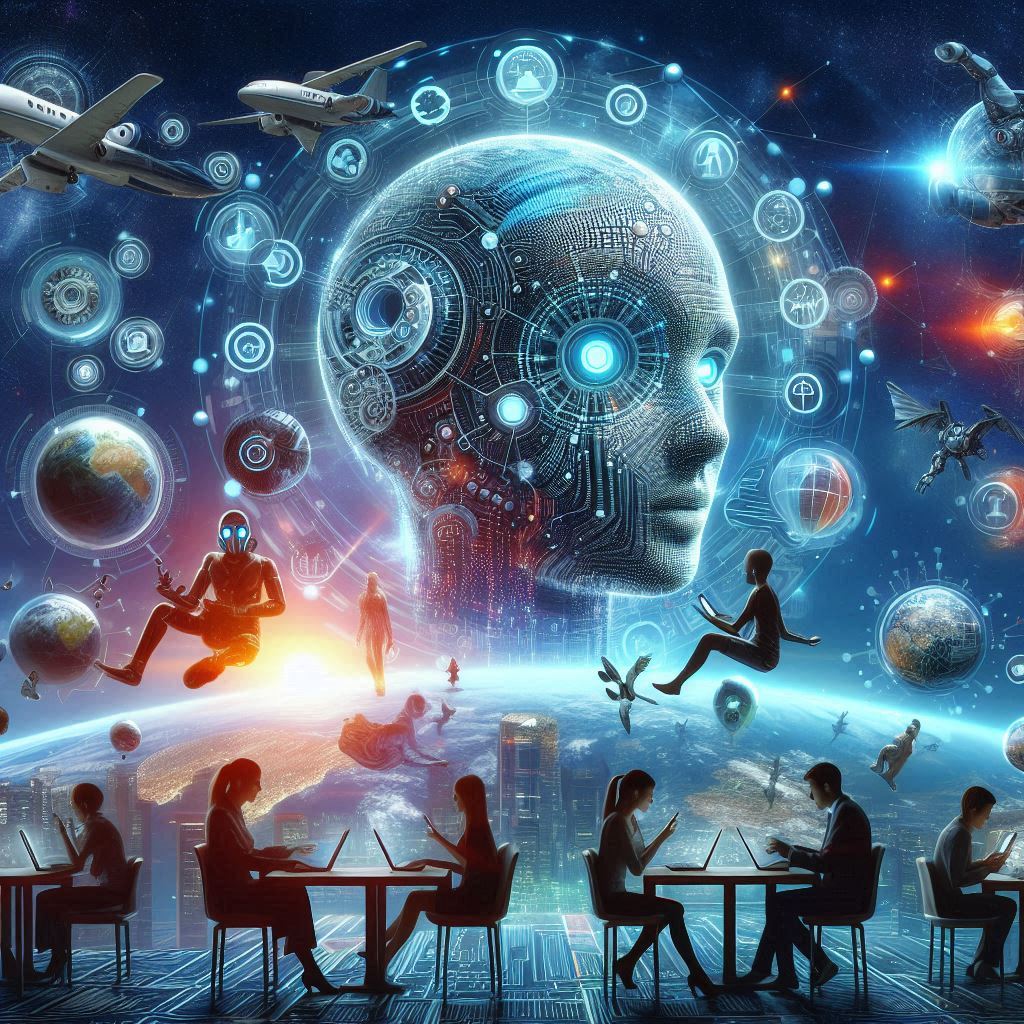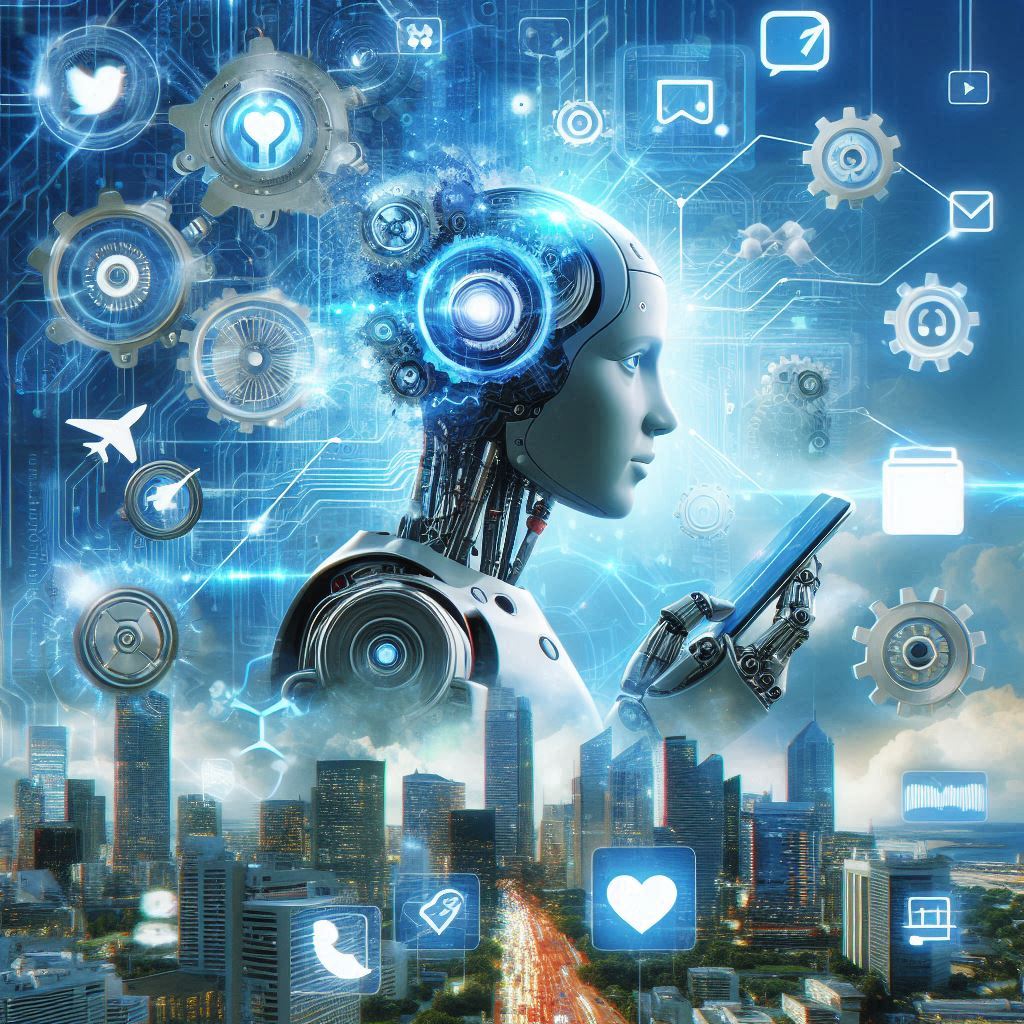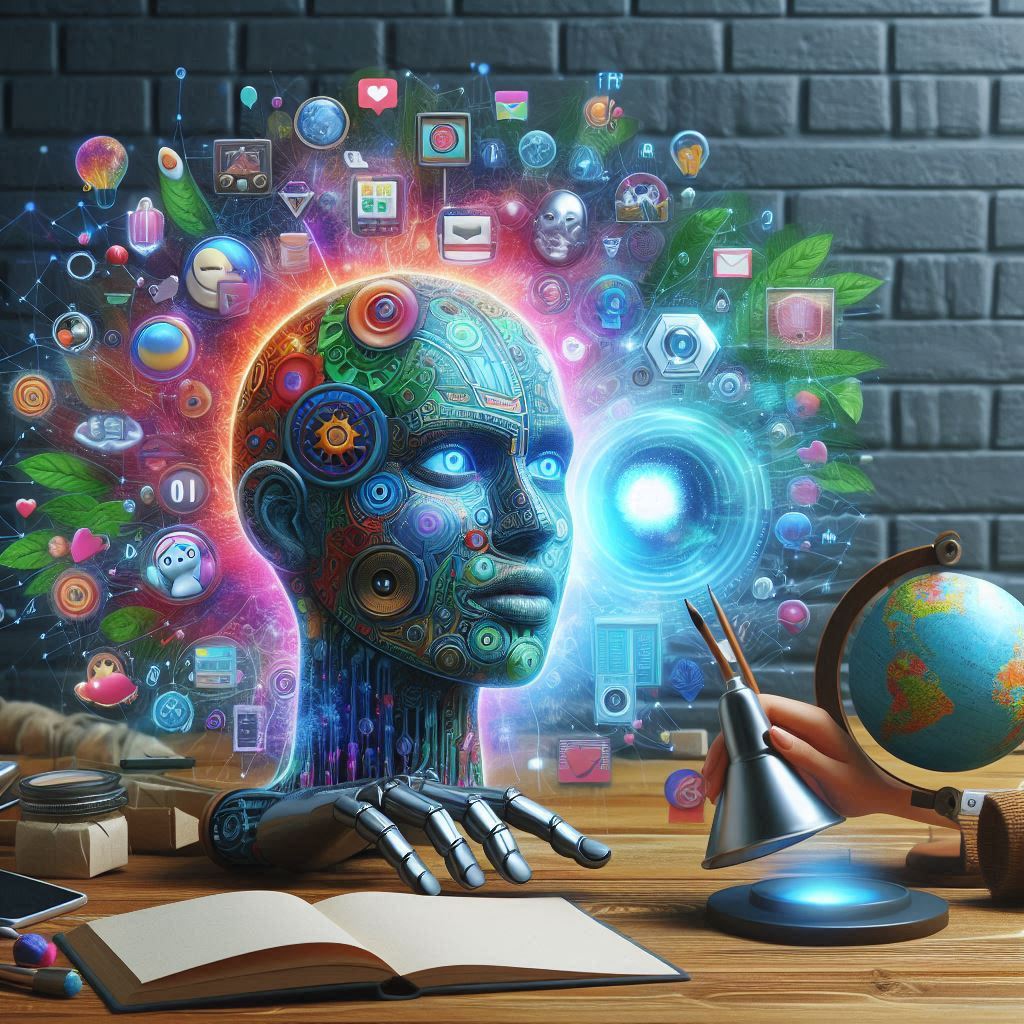Revolutionizing Social Media: The Transformative Power of AI
Ah, social media! A place where we can share our thoughts, photos of our meals, and videos of cats doing funny things. But did you know that behind every “like,” “share,” and “comment,” there is a powerful force at work? Enter Artificial Intelligence (AI) – the wizard behind the curtain transforming our social media experience.
AI: The Social Media Wizard
Imagine having a friend who knows exactly what you want to see on your feed. That’s AI for you! Social media platforms like Facebook, Instagram, and Twitter use AI to personalize your experience. They analyze your behavior, likes, and interactions to show you content that you’re more likely to engage with. It’s like having a personal assistant who knows your tastes better than your best friend!

Chabot’s: The Unsung Heroes
Ever tried to get customer support from a company on social media and received a reply within seconds? Chances are, you were chatting with a bot. AI-powered Chabot’s are the unsung heroes of social media customer service. They handle queries, provide information, and even crack a joke or two (okay, maybe not as funny as us humans, but they’re trying!). These bots ensure that customers get timely responses, making brands more responsive and approachable.
Content Creation: AI’s Artistic Side
AI isn’t just about algorithms and data crunching; it also has a creative side. Tools like Canva and Adobe Sensei use AI to help users create stunning visuals and graphics. From suggesting design layouts to auto-enhancing images, AI is making it easier for everyone to create professional-quality content. Who knew robots could have an artistic flair?
Fighting the Trolls
We all know that social media can sometimes feel like the Wild West, with trolls lurking around every corner. But fear not! AI is here to save the day. Platforms are using AI to detect and remove harmful content, spam, and fake accounts. By analyzing patterns and user behavior, AI helps keep our online spaces safer and more enjoyable. So next time you see a troll disappear, you can thank our AI sheriff!
Predicting Trends
Ever wondered how certain topics suddenly become trending? AI plays a big role in identifying and predicting trends. By analyzing vast amounts of data from posts, comments, and shares, AI can spot emerging trends before they go viral. This helps marketers, influencers, and even regular users stay ahead of the curve. It’s like having a crystal ball for social media!

The Future of Social Media and AI
As AI continues to evolve, its impact on social media will only grow. From more personalized content to advanced content moderation, the possibilities are endless. One thing is for sure: the future of social media will be smarter, more intuitive, and a lot more fun. Who knows? Maybe one day, AI will even learn to appreciate our cat videos as much as we do!
So, the next time you’re scrolling through your feed, remember that there’s a lot more going on behind the scenes than meets the eye. AI is the hidden force revolutionizing social media, making it more engaging, creative, and safe. And if you ever find yourself chatting with a bot, give it a smiley face – after all, it’s just doing its job!
AI’s Role in Social Media: Key Areas
| AI Application | Description |
|---|---|
| Personalized Feeds | AI algorithms tailor your social media feed to show content that you’re likely to engage with. |
| Chatbots | AI-powered bots handle customer queries and provide instant support on social media platforms. |
| Content Creation | AI assists in creating and enhancing visual content, making it easier to produce professional-quality posts. |
| Content Moderation | AI helps detect and remove harmful content, spam, and fake accounts to maintain a safe online environment. |
| Trend Prediction | AI analyzes data to identify emerging trends and topics before they go viral. |
Pros and Cons of AI in Social Media
| Pros | Cons |
|---|---|
| Enhanced Personalization: AI tailors your feed to show relevant content, making your social media experience more engaging. | Privacy Concerns: Personalization relies on data collection, which raises privacy issues and concerns about data security. |
| Efficient Customer Support: AI Chabot’s provide quick responses and support, improving customer service efficiency. | Impersonal Interactions: Chabot’s may lack the personal touch and empathy of human interactions, which can be frustrating for users. |
| Content Moderation: AI helps filter out harmful content, spam, and fake accounts, making social media safer. | Content Moderation Limitations: AI can sometimes struggle with nuance and context, potentially leading to over-censorship or misinterpretation. |
| Trend Prediction: AI analyzes data to predict trends, helping users and marketers stay ahead of the curve. | Trend Manipulation: AI’s predictive capabilities might be exploited to artificially create trends or manipulate public perception. |
| Enhanced Creativity: AI tools aid in content creation, making it easier to produce visually appealing posts. | Over-reliance on AI: Relying too much on AI for content creation might lead to a loss of authentic human touch and creativity. |
FAQs: Revolutionizing Social Media with AI
Welcome to our comprehensive FAQ section on how Artificial Intelligence (AI) is transforming social media. Here, we address common questions and concerns about AI’s role in shaping our digital interactions, providing insights into its benefits, challenges, and implications.
1. What is AI’s role in social media?
AI plays a crucial role in social media by enhancing user experience, improving content management, and optimizing advertising strategies. Here are some key functions:
- Personalization: AI algorithms analyze user data to deliver tailored content, advertisements, and recommendations. This ensures that users see posts and ads relevant to their interests.
- Customer Support: AI-powered Chabot’s and virtual assistants provide instant, around-the-clock support for user queries and issues.
- Content Moderation: AI helps in detecting and removing harmful or inappropriate content, ensuring a safer online environment.
- Trend Analysis: AI tools analyze large volumes of data to identify emerging trends and patterns, helping businesses and influencers stay ahead.
2. How does AI enhance personalization on social media?
AI enhances personalization through:
- Data Analysis: AI algorithms analyze user interactions, preferences, and behaviors to curate content that aligns with individual interests.
- Recommendation Systems: Based on user activity, AI suggests posts, friends, and groups that users might find engaging.
- Targeted Advertising: AI enables advertisers to deliver ads tailored to specific demographics, interests, and online behaviors, increasing the relevance of advertisements.
3. What are the benefits of AI-powered Chabot’s in customer support?
AI-powered Chabot’s offer several advantages in customer support:
- 24/7 Availability: Catboats can handle customer inquiries at any time, providing immediate responses and reducing wait times.
- Cost Efficiency: Automating routine queries decreases the need for large customer support teams, lowering operational costs.
- Consistency: Chabot’s deliver consistent responses and maintain uniform service quality across interactions.
- Scalability: AI Chabot’s can manage multiple inquiries simultaneously, efficiently handling high volumes of customer interactions.
4. How does AI contribute to content moderation on social media?
AI contributes to content moderation by:
- Automated Detection: AI algorithms can identify and flag inappropriate content, such as hate speech, spam, and misinformation, more quickly than human moderators.
- Consistency: AI ensures consistent enforcement of content policies across vast platforms, reducing the risk of oversight and bias.
- Real-Time Monitoring: AI systems continuously monitor content in real-time, allowing for prompt removal of harmful material and reducing exposure to users.
5. What are the privacy concerns associated with AI in social media?
AI’s role in social media raises several privacy concerns:
- Data Collection: AI relies on extensive data collection, which may include sensitive personal information. Users might not always be fully aware of what data is collected and how it’s used.
- Data Security: The storage and handling of large amounts of user data increase the risk of data breaches and unauthorized access.
- Surveillance: Continuous tracking and monitoring for personalization purposes can feel intrusive and raise concerns about privacy and surveillance.
6. How does AI address algorithmic bias in social media?
While AI can perpetuate biases, steps can be taken to mitigate algorithmic bias:
- Diverse Data Sets: Using diverse and representative data sets for training AI models can help reduce biases and improve fairness.
- Regular Audits: Regular audits and evaluations of AI algorithms can identify and address biased outcomes, ensuring more equitable content delivery.
- Human Oversight: Combining AI with human oversight helps in reviewing and correcting biases that automated systems might miss.
7. What are the limitations of AI in content creation?
AI has some limitations in content creation:
- Creativity Constraints: While AI tools can assist in generating content, they may lack the creativity and originality that human creators bring to their work.
- Context Understanding: AI may struggle to understand nuanced contexts and emotional subtleties, leading to less engaging or appropriate content.
- Homogenization: Excessive reliance on AI tools can lead to homogenized content, reducing the diversity of creative expression.
8. How can AI impact the authenticity of social media interactions?
AI can impact the authenticity of social media interactions in the following ways:
- Impersonal Responses: Automated responses from chatbots and virtual assistants might lack the personal touch and empathy of human interactions.
- Manipulated Content: AI can generate content that is highly polished and persuasive but may not always reflect genuine user opinions or emotions.
- Echo Chambers: AI-driven algorithms that reinforce existing preferences can create echo chambers, limiting exposure to diverse viewpoints and reducing authentic discourse.
9. What ethical concerns arise from the use of AI in social media?
Ethical concerns related to AI in social media include:
- Consent: Users may not be fully informed about how their data is used by AI systems, raising issues of consent and transparency.
- Manipulation: The use of AI to target specific audiences with tailored messages raises concerns about manipulation and the ethical use of influence.
- Misinformation: AI-generated content, including deepfakes and fake news, can be used to spread misinformation and deceive users, impacting public opinion and trust.
10. How can businesses leverage AI to improve their social media strategies?
Businesses can leverage AI in several ways:
- Targeted Advertising: Use AI to create highly targeted ad campaigns based on user demographics and behavior.
- Content Optimization: Employ AI tools to analyze engagement metrics and optimize content for better performance.
- Trend Identification: Utilize AI to track and analyze trends, allowing for timely and relevant content creation.
- Customer Insights: Leverage AI to gain deeper insights into customer preferences and behaviors, informing more effective marketing strategies.
11. What are the potential drawbacks of over-relying on AI in social media?
Potential drawbacks of over-relying on AI include:
- Loss of Human Touch: Excessive automation can reduce the personal interaction and empathy that human moderators and customer service representatives provide.
- Algorithmic Errors: AI systems are not infallible and can make errors, leading to unintended consequences or inaccuracies in content and interactions.
- Dependency Risks: Heavy reliance on AI may lead to reduced human oversight and critical thinking, potentially overlooking important nuances and context.
12. How can users protect their privacy while using AI-powered social media platforms?
Users can take several steps to protect their privacy:
- Review Privacy Settings: Regularly review and adjust privacy settings on social media platforms to control the data shared with AI systems.
- Be Informed: Stay informed about the data collection practices and policies of the social media platforms you use.
- Limit Sharing: Be cautious about the personal information shared online and avoid oversharing sensitive details.
- Use Privacy Tools: Utilize privacy tools and browser extensions that help manage and protect personal data.
This FAQ section aims to address common queries and concerns about AI in social media, offering a balanced perspective on its transformative potential and associated challenges. For further information or specific concerns, consulting with experts in AI and social media can provide additional insights and guidance

